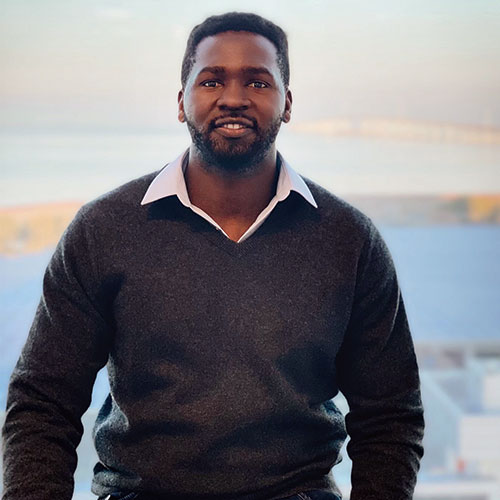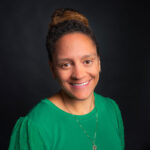
Alumnus organization features businesses that span the African continent

Representation matters to Samuel Kitara ’14. So much so that when he was crafting a list of American colleges and universities to consider applying to, he included one school for each letter of the alphabet. The United States Student Achiever Program, a program within the U.S. State Department’s office of education & cultural affairs, provided a list of colleges that had strong representation and scholarship opportunities for international students, and he made The College of Wooster his W.
“Wooster drew my attention in part because of its student ambassador program where international students got to represent their country both on campus and around town,” said Kitara. “It felt like this was a really welcoming community that would be delighted to have me, but I’d also be very much at home.”
His robust collection of 26 schools dwindled down to five and finally, one. Ultimately, he made the decision to attend Wooster because he wanted a small molecular biology program and a vibrant student population. He appreciated having 55% of his classmates come from out of state—some from as far as Alaska or California—and another 10% as international students. While he enjoyed making friends with folks from across the country, Kitara also cherished the ability to bond with a local host family—a bond that grew when they came to Uganda for three weeks to meet his family.
Following graduation, Kitara worked in functional genomics and chemical biology labs at Harvard & MIT (Dana-Farber Cancer Institute & Broad Institute) that focused on discovering new therapeutics for hard-to-treat childhood cancers. He eventually became interested in the business aspect of health care and company creation and decided to pursue his MBA from Yale School of Management. During his second year at Yale, he realized that they did not have many case studies about African companies.
“Yale is the most global school in the U.S.,” said Kitara. “We were learning about global businesses, but I noticed that the African growth story was missing, and I thought we could draw students’ attention to it.”
That’s when Yale Africa Startup Review (YASR) was born. Kitara, along with his team of co-founders/classmates from across the globe, launched this student- and alumni-led feature of startups shaping the future of entrepreneurship in Africa. At YASR.org, they share stories of ingenuity and innovation of the African startup ecosystem, to attract interested stakeholders from around the world.
As a child growing up in Uganda, Kitara saw time and time again, scrappy people both young and old trying to build a business. But more than that, they were working to solve everyday problems. “I think stories matter,” declared Kitara. “Telling the stories of high-growth startups trying to improve access to health care or education changes their future and their trajectory. It means attracting an extra customer, an employee, or a potential investor, either now or down the road. Being able to tell this story as representatives of many other people like them, for me, is very powerful.”
“A rising tide lifts all boats. When you find out one interesting company in Malawi exists, you might ask what else is there. We hope each story allows people to dig deeper.”
—Samuel Kitara ’14
For its inaugural publication, the #YASR30 list, editors reached out to investors, hubs, labs, and business accelerators on the continent for a grassroots effort to attract nominations. They hoped the nominated startups would achieve both geographical and vertical coverage to branch out beyond the familiar business hubs and financial technology field. The results were even more extensive than Kitara’s ABC list of schools: they received more than 200 nominations representing 30-plus African countries.
“The nomination process is driven by the startup ecosystem, and people nominate companies that wouldn’t normally be featured elsewhere,” said Kitara. “It’s nice to know who’s raising millions of dollars, but we shine a light on those diamonds in the rough. We want to tell their story.”
YASR’s team selected judges who are already involved in the innovation ecosystem (i.e. business leaders, entrepreneurs, investors, and academics) to evaluate the nominated startups and select 30 for the review. The inaugural list included a travel ticketing logistics app out of Gabon, a Kenyan running shoe brand, a Malawian startup diagnostic facility, and a low-cost mobile ultrasound service provider from Uganda, just to name a few.
The representation makes a big difference for these businesses. Since the list posted in 2021, Kitara said some of the featured startups have already earned big investments, including one that raised $4.2 million. Others have been accepted into seed accelerator programs, and some entrepreneurs mentioned that having their story told gives them more credibility when they go before investors.
YASR also helps align the needs of its featured startups with corporate partners who can provide legal fees, network connections, and other basic business needs. The visibility also provides an indirect talent pipeline that makes it easier for them to recruit.
“A rising tide lifts all boats,” said Kitara. “When you find out one interesting company in Malawi exists, you might ask what else is there. We hope each story allows people to dig in deeper.”
Kitara looks forward to the 2022 edition of the review which launches in March at yasr.org. But it’s not the only work that keeps him busy. He serves full time on the corporate development team for Gilead Sciences in California. His work focuses on identifying different technology and strategic collaborations across virology, oncology, and inflammation disease areas.
The African teen and aspiring biology major who was “curious about how things work” and eager to share his culture, is now empowering global collaboration. It’s fitting with the advice he has for future Scots. “Get to know the richness of people’s experiences on campus because Wooster is a petri dish of the world right there in front of you.”
A version of this story originally appeared in the spring 2022 issue of Wooster magazine.
Posted in Alumni on March 1, 2022.
Related Posts
Related Areas of Study
Business Economics
Learn how economics and quantitative methods can be applied to contemporary problems in finance, management, and business with expert faculty mentors in a diverse department
MajorBiochemistry & Molecular Biology
Biology and Chemistry combine in an interdisciplinary program for students with a passion for molecular events.
Major

